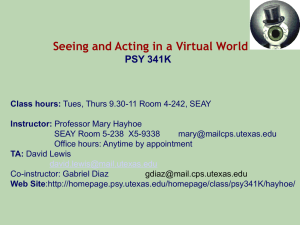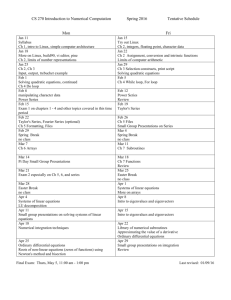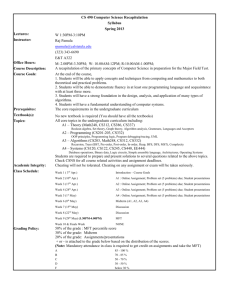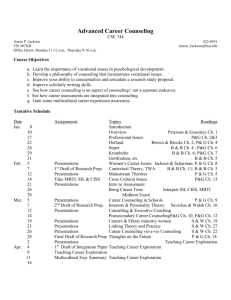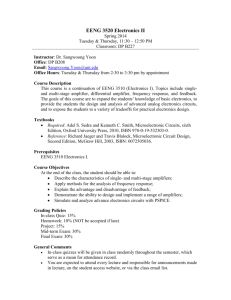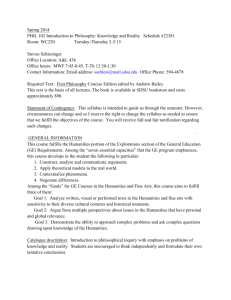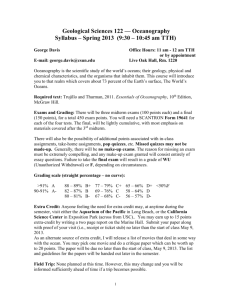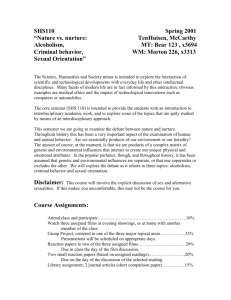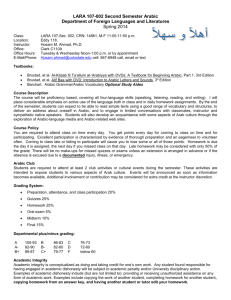PSY458syll-2015 - HomePage Server for UT Psychology
advertisement
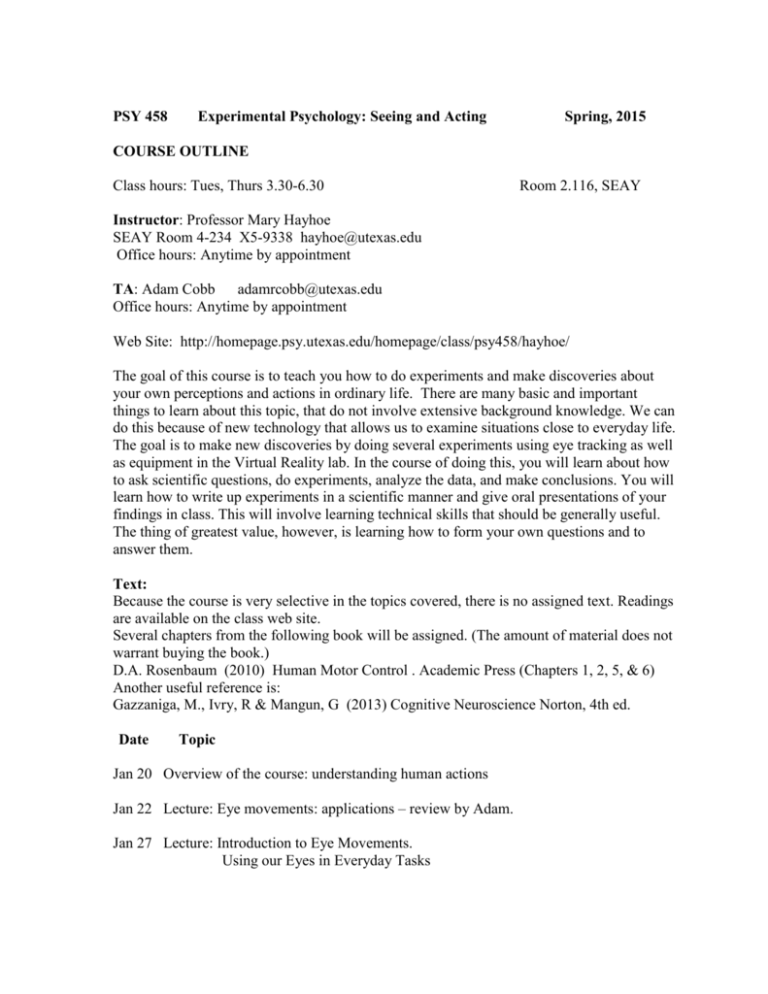
PSY 458 Experimental Psychology: Seeing and Acting Spring, 2015 COURSE OUTLINE Class hours: Tues, Thurs 3.30-6.30 Room 2.116, SEAY Instructor: Professor Mary Hayhoe SEAY Room 4-234 X5-9338 hayhoe@utexas.edu Office hours: Anytime by appointment TA: Adam Cobb adamrcobb@utexas.edu Office hours: Anytime by appointment Web Site: http://homepage.psy.utexas.edu/homepage/class/psy458/hayhoe/ The goal of this course is to teach you how to do experiments and make discoveries about your own perceptions and actions in ordinary life. There are many basic and important things to learn about this topic, that do not involve extensive background knowledge. We can do this because of new technology that allows us to examine situations close to everyday life. The goal is to make new discoveries by doing several experiments using eye tracking as well as equipment in the Virtual Reality lab. In the course of doing this, you will learn about how to ask scientific questions, do experiments, analyze the data, and make conclusions. You will learn how to write up experiments in a scientific manner and give oral presentations of your findings in class. This will involve learning technical skills that should be generally useful. The thing of greatest value, however, is learning how to form your own questions and to answer them. Text: Because the course is very selective in the topics covered, there is no assigned text. Readings are available on the class web site. Several chapters from the following book will be assigned. (The amount of material does not warrant buying the book.) D.A. Rosenbaum (2010) Human Motor Control . Academic Press (Chapters 1, 2, 5, & 6) Another useful reference is: Gazzaniga, M., Ivry, R & Mangun, G (2013) Cognitive Neuroscience Norton, 4th ed. Date Topic Jan 20 Overview of the course: understanding human actions Jan 22 Lecture: Eye movements: applications – review by Adam. Jan 27 Lecture: Introduction to Eye Movements. Using our Eyes in Everyday Tasks Lab: Calibration exercise and Measurement and analysis of basic types of eye movements. Jan 29 Lab: Tracking the eyes while throwing and catching balls. Data collection and analysis. Feb 3 Lab: Data collection and analysis Feb 5 Lab: Data collection and analysis Lecture: Neural mechanisms underlying eye movements. Feb 10 Class presentations Lab 1. How to write a lab report. Feb 12 Reading review assignment: Class presentations. Feb 17 Lecture: learning where to look. Paper 1 due Lab: Data collection – eye movements while walking with obstacles Feb 19 Lecture: eye movements and reward Lab: Data collection and analysis Feb 24 Lab: Data collection and analysis Feb 26 Class presentations Lab 2. Planning the lab report Mar 3 Review: Brainstorming new experiments Mar 5 Lecture: Interdependence of Vision and Action: Lab: Visuo-motor latency Mar10 Paper 2 due Lecture: Vision and movement. Lab: Analysis of data Mar 12 Lecture: Vision and movement. ctd Lab: Analysis and interpretation of data Mar 17, 19 Spring Break Mar 24 Class Presentation: Lab 3 Mar 26 Lecture: Attention, Memory and Vision Mar 31 Lab: Gaze in a Virtual Apartment Paper 3 due Apr 2 Lab: Gaze in a Virtual Apartment Apr 7 Lab: Gaze in a Virtual Apartment - data analysis Apr 9 Independent Projects: discussion Apr 14 Class Presentations: Lab 4 Apr 16 Independent Projects: Present ideas to class Paper 4 due Apr 21 Lab: Independent Projects data collection and analysis Apr 23 Lab: Independent Projects data collection and analysis Apr 28 Lab: Independent Projects data collection and analysis Apr 30 Lecture: Uses of virtual environments May 5 Review May 7 Presentations of Independent Projects Paper 5 Due May 11 Grading: Grades will be based on the papers. In addition, grades will take into account class attendance, participation in class discussions, and class presentations (5%). Papers should be about 7-10 pages (typewritten, double spaced) reporting the results of the lab experiments. Papers can be re-written. Writing Flag: This is a Writing Flag class. General Information: 1. The University of Texas at Austin provides upon request appropriate academic accommodations for qualified students with disabilities. For more information, contact Services for Students with Disabilities, 471-6259, http://www.utexas.edu/diversity/ddce/ssd/ 2. The Undergraduate Writing Center is a great resource available to all UT undergraduates. The UWC offers free one-on-one consulting on all writing assignments, including papers, lab reports, and personal statements. Students can call (512-471-6222) to make an appointment or walk in to the office in the FAC.
